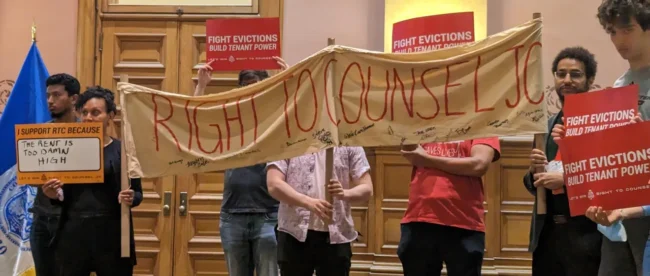The Case for Tenants’ Right to Counsel

(Source)
In 1963, the Supreme Court established that the right to counsel in criminal cases is guaranteed by the Sixth Amendment to the Constitution in Gideon v. Wainwright, meaning criminal defendants will be appointed a lawyer if they cannot afford one. On the other hand, there is no constitutionally protected right to counsel in civil cases generally. Supreme Court jurisprudence has created a presumption against the civil right to counsel in matters where “physical liberty is not at risk.” However, some states have laws that provide for appointment of counsel in certain civil cases, such as eviction, guardianship, or domestic violence.
There are significant barriers to the access to justice for civil litigants, and one primary issue is that legal representation can be difficult to afford. In New York, lawyers on average charge an hourly rate of $358. Pro se litigants consistently have much lower success rates in court than their represented counterparts. For federal civil litigation, about 27% of all cases have at least one pro se plaintiff or defendant. Additionally, 90% of landlords are represented in eviction cases, while only 10% of tenants have legal representation.
Since low-income tenants in particular often appear in court without representation, they are much more likely to face eviction. Landlords use a myriad of tactics to scare tenants who may not know their legal rights. One common practice is to lock tenants out of their homes without an eviction order in a “DIY eviction”, most never facing any legal consequences. Advocacy on the local and state levels to protect tenants from exploitation by their landlord is growing, but change is fundamentally unlikely without structural changes to the legal system. One way that some groups have pursued this is by passing local ordinances that secure tenant’s right to counsel. For example, Cleveland has passed a law guaranteeing a right to counsel in eviction cases.
As proven in both literature and local governments, guaranteeing tenants a right to counsel protects low-income communities from illegal evictions, and has the potential to protect them from other abuses. For example, right to counsel legislation in New York City increased tenant representation in court from 1% to 56%. With the shortage of affordable housing in the United States, tenants facing eviction have very few options to turn to if they want to live elsewhere. Additionally, once an eviction is on a renter’s record, it can negatively impact their credit score for up to seven years; an eviction record will also likely prevent a renter from being able to secure housing in the future, as most landlords view these records as a part of a renter’s application. On the state level, the first step to be taken should be passing laws that guarantee the right to counsel for eviction cases as a starting point. However, it can and should later be expanded to all landlord-tenant legal proceedings.
There are practical issues that would arise with the passage of these laws; for example, it would likely further burden already-struggling court systems. Moreover, government funding would be necessary to actually secure lawyers for all litigants who need one. However, people should not be deprived of their right to access the court system because of these barriers. Tenant’s right to counsel can also be used as a way to combat the increasing homeless rates across the country. Addressing these practical issues requires collaboration between stakeholders and ongoing evaluation of the effectiveness of legal representation programs for tenants. Despite these challenges, guaranteeing tenants the right to counsel can be a valuable tool for promoting fairness, justice, and human rights in the housing sector.
Suggested Citation: Hannah Young, The Case for Tenants’ Right to Counsel, Cornell J.L. & Pub. Pol’y, The Issue Spotter (April 18, 2024), http://jlpp.org/blogzine/the-case-for-tenants-right-to-counsel.

Hannah Young is a second-year law student at Cornell Law School. She graduated from Cornell University with a degree in Industrial and Labor Relations. Aside from her involvement with Cornell Law School’s Journal of Law and Public Policy, she is involved in the Women’s Law Coalition and serves as a student representative on the faculty Wellness Committee.
